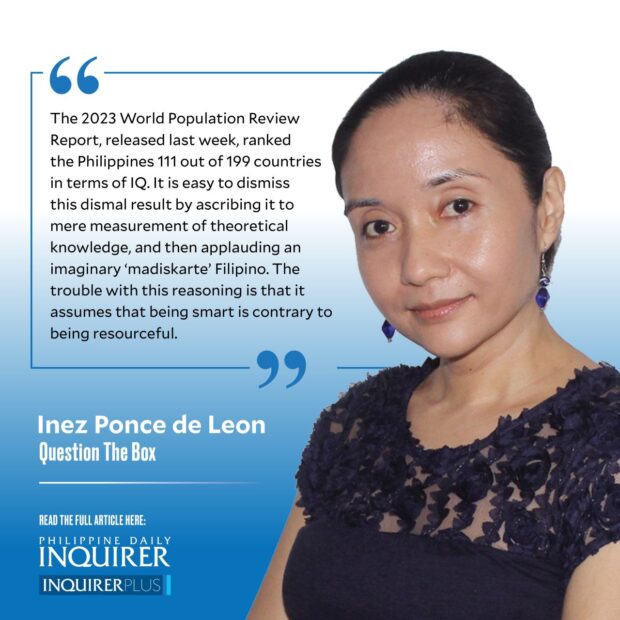Of, about, and beyond IQ
 The 2023 World Population Review Report, released last week, ranked the Philippines 111 out of 199 countries in terms of IQ. The score wasn’t derived from a single exam, but from a variety of sources, including test scores and the educational resources available to a country’s citizens.
The 2023 World Population Review Report, released last week, ranked the Philippines 111 out of 199 countries in terms of IQ. The score wasn’t derived from a single exam, but from a variety of sources, including test scores and the educational resources available to a country’s citizens.
It is easy to dismiss this dismal result by ascribing it to mere measurement of theoretical knowledge, and then applauding an imaginary madiskarte Filipino. The trouble with this reasoning is that it assumes that being smart is contrary to being resourceful.
The problem remains, however: On average, a Filipino, even with a diploma, shows very few signs of being educated.
Article continues after this advertisementThere are many factors that come into play here. Nutrition, at all stages of one’s life, is one.
Another factor: The prevailing environment. Some might label it anti-intellectualism, but this reduces using information to the act of merely using one’s head over everything else. On the contrary: Our problem is the inability to discern when one has too little information on an issue, and therefore has to seek more information before reacting.
The problem, therefore, is a combination of low IQ (inability to carry out abstract reasoning) and low EQ (inability to regulate one’s emotions).Yet another factor: Lack of training in and practice of critical thinking.
Article continues after this advertisementThis problem arises from early childhood: Children grow up in an environment where they are applauded for following orders, imitating moves, and meeting adults’ expectations of a docile, obedient child who is promised severe punishment for independent thinking.
When these children go to school, they might enter an overpopulated classroom that teachers have neither the energy nor resources to manage. Exams are administered in multiple-choice format, forcing children to memorize their answers. Awards are handed out to students who know how to get high test scores.
Or: the students might enter a learner-centered classroom, and engage in problem-solving activities, debates, and discussions. When they get home, however, their families shame them for their new ideas, which then reinforces their belief that school is an isolated space divorced from “the real world” i.e., a space where everyone has to conform.
For the thinking, innovative students, school becomes their safe place. For others, school is simply one more hurdle they must undergo, a set of exams they must take, a checklist they must complete.
There, too, is another critical thinking skill that is disappearing: The ability to accept criticism and admit when one is wrong, rather than take a defensive stance and justify one’s mistakes. This is evident everywhere: online, among voters, in our students.
The problem is thorny, with many causes.
It’s in government infrastructure that focuses on metrics that are testable by examinations, rather than actual, implemented programs in critical thinking. It is a government that ignores social sciences research, which has long pointed to the futility of simply handing out information, and which advocates for collaboration with specific groups to encourage them to analyze and solve problems on their own.
It’s in an environment that resigns itself to the meaningless excuse of “that’s just our culture” as it raises children to be dependent on grades for their self-esteem, to be fearful of taking risks for their thinking, to view mistakes as wrongdoing punishable by self-flagellation.
It’s this same environment that pushes “good vibes” as answer to criticism, as though criticism were some demon that could simply be driven out by the fireworks of mindless celebration.
It’s an education system that is unevenly implemented, a job market that focuses on work experience but invests little in continuing education.
It’s the learners, who need to start standing up for themselves, to grow through their difficulties instead of viewing themselves as mere victims of a flawed system.
It’s a general culture that conceives of people as static templates, rather than as human beings constantly reshaped by lifelong learning.
No, it’s not “just a culture.” Culture always evolves. Let’s hope our culture slowly sheds its deeply fundamentalist nature in favor of one that listens, observes, acknowledges wrongdoing, and then sets out to solve problems rather than bury them.
iponcedeleon@ateneo.edu
















